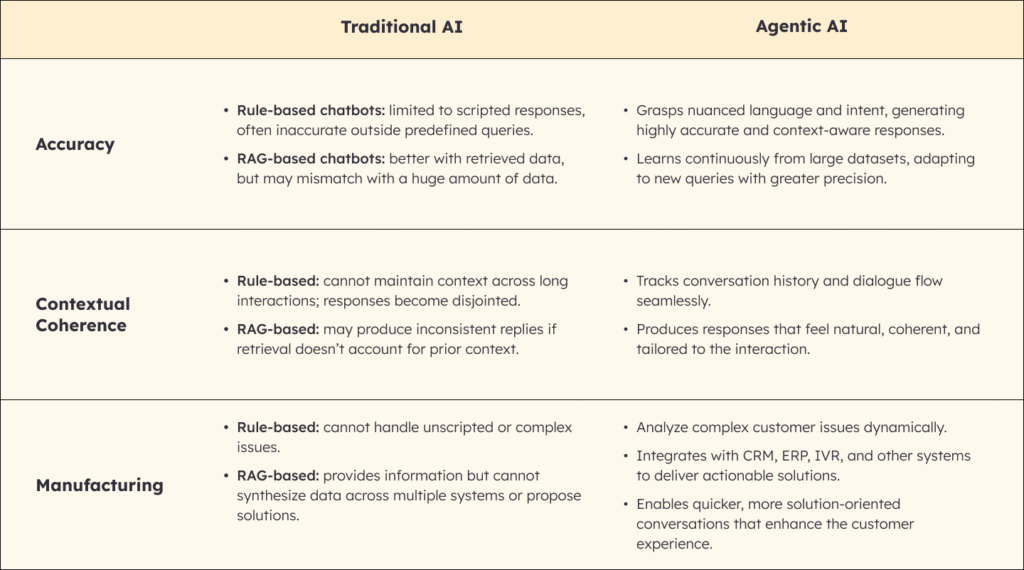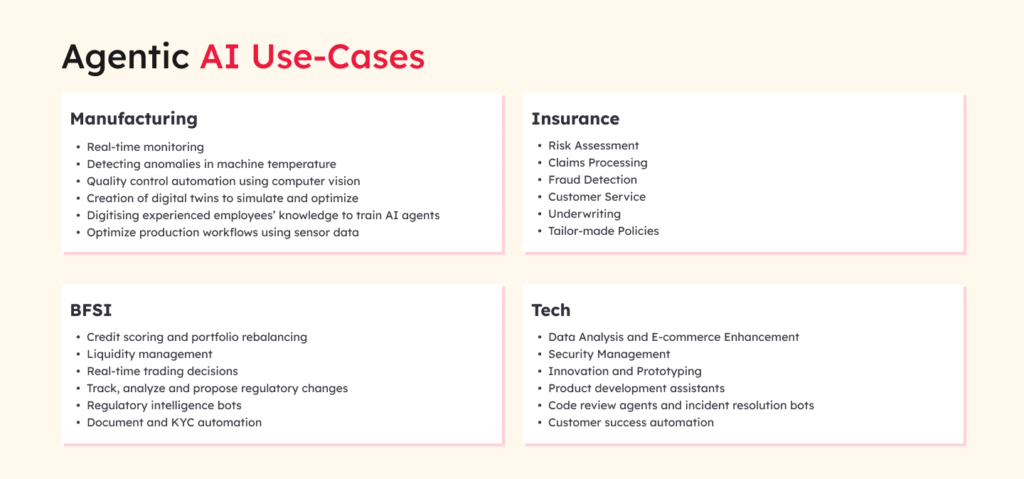Agentic AI: The Next Leap Beyond Automation
In a world driven by complexity and constant change, agentic AI offers what static automation cannot: adaptability, autonomy, and continuous improvement. It’s not just about automating tasks; it’s about giving machines agency.
By simply observing, planning, and acting autonomously, they offer a new era of end-to-end transformation, streamlining operations, quick decision-making, providing actionable insights, and elevating human potential across every industry.
Put simply, AI agents are intelligent systems that leverage tools to achieve goals autonomously. They retain memory across tasks, utilize multiple AI models, and seamlessly automate routine tasks. They are empowered to autonomously decide when to interact with internal or external systems on a user’s behalf. Unlike traditional ML or RPA, Agentic AI adapts dynamically, empowering businesses to anticipate market shifts, personalize customer experiences, and unlock innovation.
With its scalability, low entry barriers, and proven efficiency, Agentic AI liberates teams to focus on high-impact, strategic work.
Here’s how it works:
- Works on the data provided by the user
- Offers recommendations
- Analyzes performance
- Execute tasks
How traditional AI is different from Agentic AI

Advantages of Agentic AI
Autonomous Decision-Making
Agentic AI doesn’t just follow rules. It makes context-aware decisions. It can interpret goals, evaluate outcomes, and choose the best course of action, reducing the need for constant human input.
Goal-Oriented Execution
Agentic AI can work toward high-level goals. It adapts its path dynamically based on changing inputs, priorities, and real-time feedback.
Continuous Learning & Improvement
These agents learn from experience, interactions, and feedback. Over time, they refine their decision-making, get better at anticipating needs, and optimize processes on their own.
Reduced Operational Overhead
By handling multi-step tasks independently, from data gathering to action, agentic AI reduces the number of handoffs and approvals needed, freeing teams to focus on strategic work.
Personalization at Scale
Agentic AI can adapt its behavior to individuals, be it customers, employees, or users. It delivers contextual, real-time personalization across workflows and experiences.
Increased Resilience and Adaptability
Because Agentic AI can reason, learn, and pivot, it handles uncertainty better than rigid automation. It continues functioning even when inputs vary or unexpected conditions arise.
Orchestration Across Systems
It acts as a digital “glue” between tools and systems, initiating and completing tasks across applications without human handholding.
Market Trends
The market for AI agents is expected to grow at a 45% CAGR over 5 years.
ROI of 13.7% from AI agents, surpassing the 12.6% they expect from non-agentic GenAI applications.
58% of companies report that they are already deploying AI agents; another 35% are actively exploring potential use cases.
Customer service and support remain the leading application of AI agents: 53% of companies now use the technology in this area; another 13% are interested in implementing it.
(Source: BCG)
By 2029, agentic AI will autonomously resolve 80% of common customer service issues without human intervention, leading to a 30% reduction in operational costs, according to Gartner, Inc.
(Source: https://www.servicenow.com/uk/blogs/2025/agentic-ai-manufacturing)

Final Thoughts
To scale impact in the agentic era, organizations must shift their AI strategies from disconnected experiments to strategic, business-wide programs; from isolated use cases to end-to-end process automation; from siloed AI teams to collaborative, cross-functional squads; and from one-off pilots to robust, scalable solutions.
Equally important will be laying the groundwork for long-term success. This means upskilling the workforce, evolving the technology stack, accelerating data productization, and establishing robust, agent-specific governance. The time for ad hoc generative AI trials is over, and this decisive pivot must come from the very top.
Want to learn more about agenticAI and how it can benefit your industry? Get in touch with us today.
FAQs
1. What is agentic AI, and how is it different from traditional AI?
Ans: Agentic AI refers to intelligent systems that can observe, plan, and act autonomously to achieve goals. Unlike traditional rule-based or retrieval-based AI, agentic AI learns continuously, understands context, makes decisions, and orchestrates multi-step tasks across systems without constant human input.
2. How can agentic AI improve operational efficiency?
Ans: Agentic AI reduces manual handoffs by independently handling complex workflows, from data gathering to action. This lowers operational overhead and enables teams to focus on strategic, high-impact work.
3. What are real-world use cases of agentic AI in industries like manufacturing or insurance?
Ans: In manufacturing, agentic AI powers predictive maintenance, quality control, and digital twins. In insurance, it automates claims processing, fraud detection, customer service, and underwriting, boosting speed, accuracy, and personalization.
4. Can agentic AI personalize experiences at scale?
Ans: Yes. Agentic AI adapts its behavior based on user profiles, behaviors, and goals. It delivers contextual, real-time personalization across customer and employee workflows, improving engagement and satisfaction.
5. What are the business benefits of adopting agentic AI?
Ans: Businesses see faster decision-making, greater adaptability, lower costs, and a stronger customer experience. Agentic AI also helps companies stay resilient during disruptions by adapting to real-time input and changing conditions.







